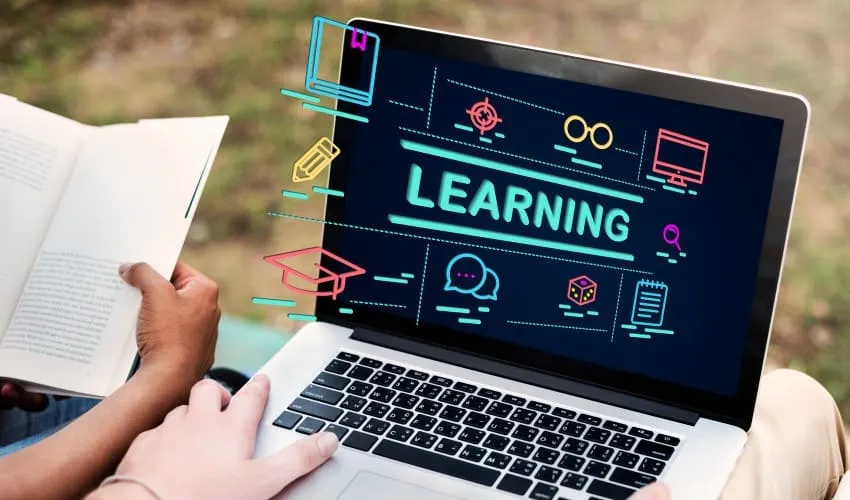Enhance your corporate learning with our eLearning software development services. We digitally transform your learning experience and maximize ROI. Our solutions streamline corporate learning, leveraging modern technologies and revamping existing eLearning software.
Unlock the future of education with our comprehensive eLearning solutions. From custom platform-based LMS development to immersive learning experiences, we are your partner in advancing education.

We create easy-to-use, interoperable custom e-learning portals that serve the corporate, education, non-profit, government, and non-government sectors' critical business needs.
Our experts use their strong mobile app development experience to deliver user-centric mobile learning apps and enable users to gain knowledge at any place.
We develop on-demand e-learning solutions for enterprises that increase efficiency and competency among employees.
We develop versatile software to meet specific eLearning requirements, offering customizable course creation tools, interactive eLearning content, gamification features, etc.
A Learning Experience Platform serves as a centralized hub for eLearning content, aggregating resources from various sources and offering easy access to learners.
We streamlines eLearning content-related activities, empowering instructional designers with comprehensive control over content creation, delivery, analytics, and more.
A Knowledge Management Solution facilitates efficient knowledge sharing, organization, and retrieval within an organization, encompassing:
Experience the future of education with eLearning.

We cater to all their varied requirements, from startups to big enterprises, development organizations to digital agencies, and SMEs to governments. Our commitment to quality and safety has enabled us to lead the market, becoming the top dApps development service company.
From startups to big enterprises, development
From startups to big enterprises, development
From startups to big enterprises, development
From startups to big enterprises, development
From startups to big enterprises, development
From startups to big enterprises, development
From startups to big enterprises, development
Engage, educate, and empower with our solutions.


Developing an eLearning app requires a systematic approach to ensure a successful outcome. In one of our most read blog posts, we’ve shared the secret behind our eLearning app’s success. Here is a step-by-step guide to eLearning app development:
Define Requirements: Identify the target audience, learning objectives, and desired features of the app. Conduct thorough research and gather all necessary information.
Design User Interface: Create wireframes and prototypes to design a user-friendly and intuitive interface. Consider the app’s visual appeal, navigation flow, and multimedia integration for an engaging learning experience.
Develop Backend: Set up the server infrastructure, database, and APIs required to support the app’s functionality. Choose appropriate technologies and frameworks based on scalability and performance requirements.
Implement Features: Develop the core features of the eLearning app, such as user registration, course management, multimedia content delivery, assessments, and progress tracking. Ensure seamless integration and smooth functionality.
Test & Debug: Conduct rigorous testing to identify and fix bugs or usability issues. Conduct functional, performance, and compatibility testing on different devices and platforms.
Deploy & Launch: Prepare the app for deployment by hosting it on a reliable server or cloud platform. Ensure proper configuration and security measures. Publish the app on relevant app stores or web platforms.
Provide Maintenance & Support: Continuously monitor and maintain the app’s performance, security, and usability. Regularly update the app with new features, bug fixes, and enhancements based on user feedback and emerging technologies.
By following this step-by-step guide, you can ensure a systematic and practical approach to eLearning app development, resulting in a high-quality and user-centric learning experience.
 eLearning apps utilize a range of technologies to deliver effective online learning experiences. These technologies are chosen based on platform compatibility, performance, scalability, and user experience.
eLearning apps utilize a range of technologies to deliver effective online learning experiences. These technologies are chosen based on platform compatibility, performance, scalability, and user experience.
These languages provide the foundation for building interactive and feature-rich eLearning apps. In addition, frameworks like AngularJS, Laravel, Django, and Node.js are used for web-based eLearning app development.
These frameworks offer robust development environments, facilitate server-side scripting, and enable responsive and scalable web application creation.
To enhance the user experiences, technologies like HTML5, CSS3, and JavaScript create visually appealing and interactive interfaces.
The eLearning apps seamlessly integrate multimedia elements such as videos, audio files, and images.
Cloud platforms and databases like AWS, Azure, MySQL, and MongoDB are used for data storage, hosting, and scalability. These technologies ensure reliable performance and enable efficient data management.
One of our famous blog post discussed how several EdTech giants are leveraging Data Science in Edtech to maximize their student retention and platform’s success.

eLearning apps come in various types, each designed to cater to specific learning needs and objectives. Here are some common types of eLearning apps:
Learning Management Systems (LMS): These apps provide a centralized platform for managing and delivering online courses, tracking progress, and generating reports. They offer features like course organization, user management, assessments, and content management.
Language Learning Apps: These apps focus on teaching languages through interactive lessons, vocabulary-building exercises, pronunciation guides, and cultural immersion. They often include features like speech recognition, gamification, and progress tracking.
Skill-Based Learning Apps: These apps target specific skills such as coding, graphic design, music, or cooking. They provide structured learning paths, tutorials, practice exercises, and sometimes even mentorship opportunities.
MOOC (Massive Open Online Course) Platforms: MOOC apps offer free or affordable courses from renowned universities and institutions. They provide a wide range of subjects, often including discussion forums, peer interaction, and certificates upon completion.
Corporate Training Apps: Designed for employee training, these apps offer modules on compliance, leadership, customer service, and more. They can include interactive simulations, quizzes, and tracking features for organizations to monitor progress.
Test Preparation Apps: These apps help students prepare for standardized tests like SAT, GRE, or GMAT. They provide practice questions, study materials, performance analysis, and progress tracking.
Educational Gaming Apps: These apps blend learning and gaming elements to engage learners. They offer educational content through interactive games, puzzles, quizzes, and challenges.
These types of eLearning apps provide diverse options for learners to engage in online education and training based on their specific interests, goals, and learning styles.

There are many advantages of eLearning software development, but here are some of the most significant ones:
Increased engagement and motivation: eLearning can be more engaging and motivating for learners than traditional classroom learning. This is because learners can control their own learning pace and choose what they want to learn.
Improved access to learning materials: eLearning Software Development provides learners access to a wide range of learning materials, including videos, audio files, and articles. This means learners can find the material best suits their learning needs and preferences.
Greater flexibility: eLearning Software Development is more flexible than traditional classroom learning. Learners can study at their convenience and access learning materials from anywhere in the world.
Enhanced interaction: eLearning Software Development enables learners to interact with each other and instructors through forums, chat rooms, and other means. This enhances the learning experience and helps learners to retain more information.
Cost-effective: eLearning Software Development is more cost-effective than traditional classroom learning. This is because there are no travel costs involved, and learners can study at their own pace.

Integrating Artificial Intelligence (AI) and Machine Learning (ML) in eLearning opens up new possibilities for personalized and adaptive learning experiences.
AI and ML algorithms can analyze learner data, identify patterns, and provide tailored content recommendations, adaptive assessments, and individualized learning paths.
These technologies enable intelligent feedback, automated grading, and real-time monitoring of learner progress.
AI-powered chatbots and virtual assistants can offer instant support and guidance to learners. Natural language processing (NLP) capabilities can facilitate automated speech recognition and language learning.
By integrating AI and ML in eLearning, organizations can enhance engagement, improve learning outcomes, and provide learners with a more customized and efficient learning experience.

Security and data privacy are critical considerations in eLearning software. Robust security measures must be implemented to protect sensitive user data.
This includes encryption techniques, secure authentication mechanisms, and secure data storage. Compliance with data protection regulations, such as GDPR, is crucial.
User privacy should be ensured by obtaining informed consent, providing transparent data handling practices, and allowing users to manage their data.
Regular security audits, vulnerability assessments, and updates are necessary to address emerging threats.
By prioritizing security and data privacy, eLearning software can create a safe and trustworthy environment for learners, instilling confidence in the platform and protecting sensitive information.
Android app development is booming, and it doesn’t seem to be slowing down anytime soon. With an estimated 133 million
Learn MoreThe client wanted to enhance their learning management system for their education network.
One of the largest Ed-tech firms based in India with the biggest user base of students in the country, contacted ValueCoders to create their digital assets.
Are you a startup, an Entrepreneur, or an enterprise? Or a mobile app developer who wants to know about the
Learn MoreHere are answers to some questions related to eLearning Software Development that our clients frequently ask:
Ans. ValueCoders provides access to 650+ IT specialists with extensive knowledge across domains. With years of global experience, we deliver high-quality eLearning software development services, leveraging domain expertise and proven methodologies. Our cost-effective, proactive approach positions us as a leading eLearning digital transformation company in India.
Ans. We have a team of highly skilled and experienced professionals who can help you with a wide range of eLearning consulting services, web & mobile app development, and more. We provide these services at a competitive price.
We charge an hourly rate of $25 for eLearning software development services. The cost of eLearning development services depends on multiple factors, such as:
For more clarity on the cost, you can contact us.
Ans. As a leading eLearning software development company, we serve over 500 clients globally, including renowned enterprises like Johnson & Johnson, Pfizer, and L’Oreal. Our comprehensive services span web development, mobile app development, digital marketing, and more. With a diverse client base encompassing SMEs, enterprises, ISVs, and digital agencies, we cater to various industries such as healthcare, education, retail, publishing, FMCG, and real estate. Our reach extends across North America, Europe, Africa, the Middle East, and the Asia Pacific, assisting tech-enabled firms with customized eLearning software development.
Ans. We generally follow a three-step process: scope understanding, technical discussion, and documentation.
Scope Understanding: In the first step, our business analysts gather all the information from you.
Technical Discussion: After gaining a comprehensive understanding of your vision and requirements, we hold a technical discussion to build a roadmap.
Documentation: In the last step, we prepare the final documentation of all your requirements. We also provide an accurate deadline for the completion of the project.
Ans. We typically recommend a three-phase methodology for enterprise eLearning digital transformation:
Assessment phase: In this phase, we assess your current state and identify where you need to make changes.
Implementation phase: This is where you’ll begin implementing the changes identified in the assessment phase.
Maintenance and evolution phase: Once the implementation phase is complete, it’s important to put into place a plan for the ongoing maintenance and evolution of your new systems.
Ans. Yes, we provide comprehensive maintenance and support services for eLearning apps even after the development phase. Our dedicated support team ensures your eLearning app remains up-to-date, functional, and secure. We offer regular software updates, bug fixing, performance optimization, and technical assistance to address any issues that may arise. Our goal is to provide a smooth and hassle-free experience so that you can focus on delivering quality education and training.
We are grateful for our clients’ trust in us, and we take great pride in delivering quality solutions that exceed their expectations. Here is what some of them have to say about us:
Trusted by Startups and Fortune 500 companies
We can handle projects of all complexities.
Startups to Fortune 500, we have worked with all.
Top 1% industry talent to ensure your digital success.



Let's discuss how we can bring your vision to life.